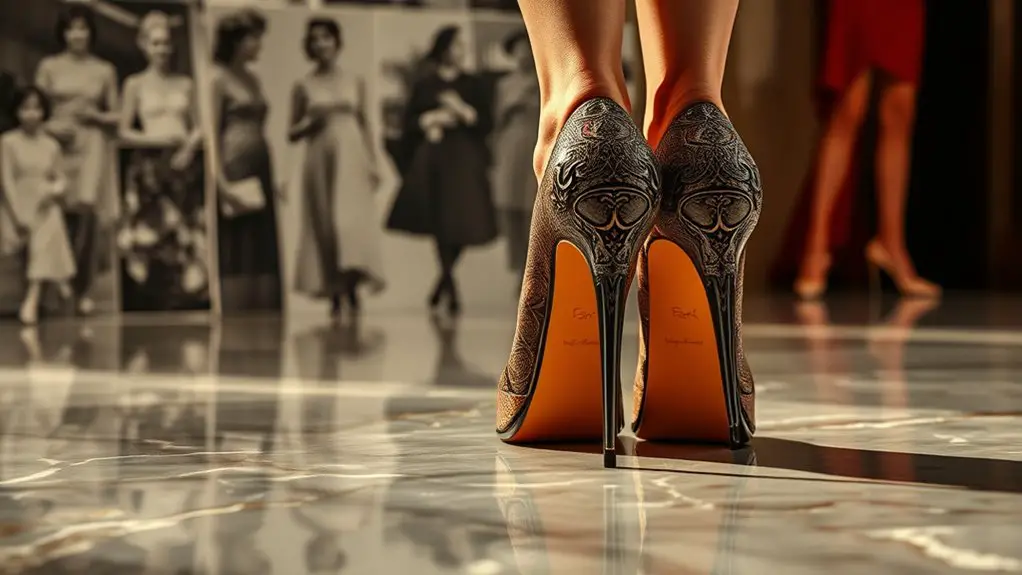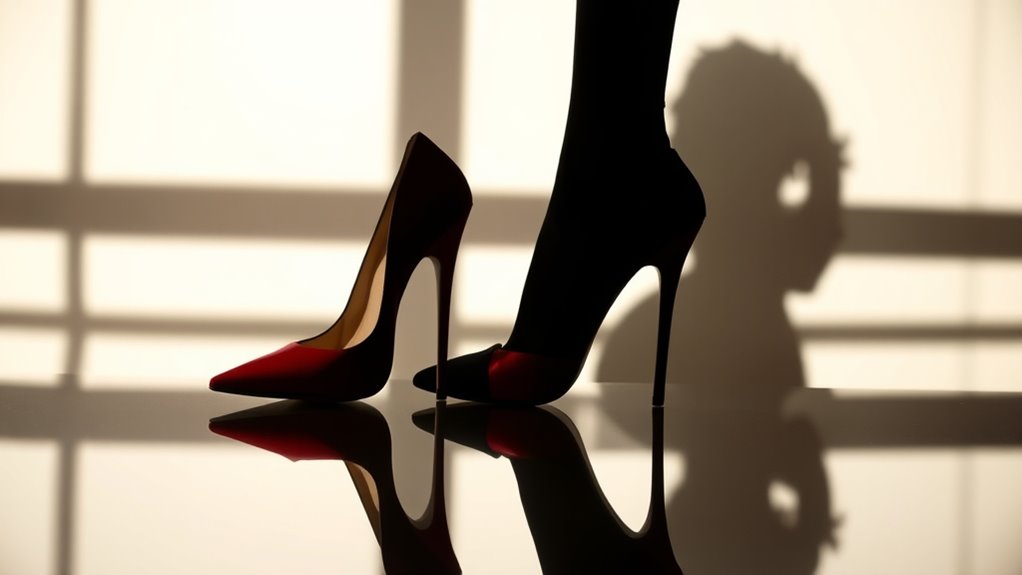Wearing high heels can greatly influence your psychology. They often boost your confidence and enhance self-expression by changing your posture and body language. However, this transformation can come with discomfort and pressure to conform to societal beauty standards, impacting your self-esteem. While heels can make you feel empowered, they may also lead to frustration and anxiety if they’re uncomfortable. Understanding these dynamics can help you navigate your choices more mindfully, and there’s much more to explore about this complex relationship.
The History and Cultural Significance of High Heels

Although high heels might seem like a modern fashion statement, their origins date back to the 10th century when Persian cavalry wore them to secure their footing in stirrups. Over centuries, high heels underwent a fascinating historical evolution, shifting from practical wear to symbols of status and femininity. In Europe, during the 17th century, they became a staple among aristocrats, representing wealth and power.
As you explore their cultural symbolism, you’ll notice how high heels often embody societal expectations of beauty and femininity. They’ve been both celebrated and criticized, reflecting changing attitudes toward gender and fashion. While some see them as empowering, others argue they perpetuate unrealistic beauty standards. This duality invites you to critically examine your own perceptions of high heels and what they represent in your life. Understanding their history can deepen your appreciation for the complexities they bring to modern fashion and self-expression.
High Heels and Body Language: How They Influence Perception
The cultural significance of high heels extends beyond their historical context, influencing not just fashion but also body language and perception. When you wear high heels, your posture shifts, and so does how others perceive you. This shift can evoke a range of emotions and interpretations, both positive and negative.
- Heightened confidence
- Enhanced femininity
- Increased attention
- Possible judgment
Your body language subtly changes, making you appear more assertive or elegant. However, it can also lead to assumptions about your intentions and capabilities. High heels can amplify your presence, yet they might also pigeonhole you into stereotypes. Understanding this duality is essential; the perception influence is powerful. It’s not just about how you feel in heels, but how the world interprets you because of them. Your choice in footwear speaks volumes, shaping interactions and experiences in ways you may not initially consider.
The Boost in Confidence: Psychological Benefits of Wearing Heels

Confidence can be a powerful catalyst for personal and professional growth, and wearing high heels often serves as a key that reveals this potential. When you slip on a pair of heels, you may notice an immediate confidence boost. This isn’t just about height; it’s about how you perceive yourself. Heels can enhance your self-expression, allowing you to showcase your style and personality.
As you walk in heels, you might feel more empowered and assertive, which can translate into how others perceive you. It’s fascinating how a simple accessory can impact your mindset and demeanor. You may find that wearing heels encourages you to stand taller, both physically and emotionally, helping you embrace opportunities with greater assurance. So, the next time you put on those heels, remember: it’s not just footwear; it’s a tool for revealing your confidence and amplifying your unique voice in the world.
The Impact on Posture and Movement
Wearing high heels doesn’t just elevate your stature; it markedly affects how you carry yourself. You may feel more confident, but the physical implications can be significant. High heels alter your posture alignment, shifting your center of gravity and changing your weight distribution. This can lead to:
Wearing high heels boosts confidence but significantly impacts posture and weight distribution, leading to potential discomfort.
- Increased muscle strain in your calves and lower back
- Balance challenges that make walking feel precarious
- Gait alteration, as you adapt to the new height
- Joint impact, particularly on your knees and hips
These factors can create discomfort and even long-term complications. Your foot arching becomes exaggerated, leading to fatigue and soreness. As you navigate through life in these shoes, it’s important to recognize how these changes in movement dynamics can affect your overall well-being. While you might enjoy the aesthetic boost, consider the physical costs of maintaining that elevated position.
High Heels and Self-Esteem: A Double-Edged Sword

Although high heels can boost your appearance, their influence on self-esteem can be paradoxical. You might feel more confident and powerful when you slip into a pair, as they can elevate your self-image perceptions. Society often equates height with attractiveness, and wearing heels may align you with cultural expectations of femininity and elegance.
However, this boost can be fleeting. The pressure to conform to these ideals might lead to feelings of inadequacy when you’re not wearing heels or when you perceive others as more attractive. High heels can create a double-edged sword: they enhance your appearance but can also set unattainable standards that impact your self-worth.
Navigating this intricate relationship requires self-awareness. Recognizing the cultural narratives surrounding heels can help you appreciate their aesthetic value without letting them dictate your self-esteem. Ultimately, it’s essential to embrace your worth beyond footwear.
The Pain Factor: Physical Discomfort and Its Psychological Effects
Wearing high heels often brings a wave of physical discomfort that can weigh heavily on your emotional well-being. As you navigate through the pain, it’s not just your feet that suffer; your confidence and overall mood can take a significant hit. Understanding this connection between physical pain and emotional impact is essential to grasping how high heels affect your psyche.
Physical Pain Experience
When you slip on a pair of high heels, it’s not just your feet that endure the strain; the psychological impact of that physical discomfort can be profound. Chronic discomfort, coupled with the need for pain tolerance, affects your daily experiences and self-perception. You might find yourself grappling with feelings like:
- Frustration over limited mobility
- Anxiety about your physical appearance
- A sense of defeat from persistent pain
- Isolation from social situations due to discomfort
These emotions can compound over time, leading to a disconnect between how you feel and how you present yourself. Understanding the psychological ramifications of high heel-induced pain can help you navigate your choices and prioritize your comfort without sacrificing your style.
Emotional Impact and Confidence
Many women find that the emotional impact of wearing high heels extends far beyond the physical discomfort they experience. The struggle with pain can often lead to feelings of insecurity and diminished self-worth, overshadowing the confidence these shoes are supposed to provide. Yet, for many, high heels serve as a form of self-expression, a way to project strength and femininity. This duality fosters emotional resilience; you may find that despite the discomfort, the act of wearing heels empowers you to face the world with boldness. Balancing the pain with the psychological benefits can enhance your emotional landscape, allowing you to embrace both the struggle and the confidence that comes with stepping into your own unique style.
Societal Pressures and the Expectation to Wear Heels
Although high heels are often celebrated for their aesthetic appeal, the societal pressures surrounding their use can create significant emotional strain. You might find yourself caught in a web of societal norms and gender expectations that dictate how you should look and feel. This pressure can lead to a host of conflicting emotions, such as:
- Insecurity about your appearance without heels
- Frustration over the discomfort and pain they can cause
- Anxiety about fitting in or being judged
- Resentment towards societal standards that prioritize style over comfort
These feelings aren’t just fleeting; they can deeply affect your self-esteem and overall mental well-being. It is crucial to recognize that the expectation to wear heels often stems from an outdated notion of femininity, leaving many to struggle with the balance between personal comfort and societal demands. Understanding this dynamic can help you navigate your choices with greater awareness and confidence.
Finding Balance: Embracing Comfort and Style
Finding a balance between comfort and style can feel like a challenging task, especially in a world that often prioritizes appearance over well-being. When you step into high heels, it’s easy to slip out of your comfort zones, sacrificing ease for the sake of style choices that society deems attractive. However, it’s essential to recognize that true confidence stems from feeling good in what you wear.
Embracing comfort doesn’t mean compromising on style; it’s about redefining your aesthetic to include both. Opt for shoes that offer support without sacrificing flair, allowing you to express your personality while remaining comfortable. Experiment with different heights and styles, and don’t be afraid to challenge societal norms. By prioritizing your own comfort, you create a unique blend of style that resonates with your authentic self, making you not just a fashionable figure, but also a comfortable one.
Frequently Asked Questions
Do High Heels Affect Mental Health in the Long Term?
They say, “Beauty is pain,” but wearing high heels can long-term affect your mental health. Their influence on self-esteem and body image could lead to lasting psychological challenges, shaping how you perceive yourself in society.
Are There Any Benefits to Wearing Flats Instead of Heels?
Wearing flats offers significant comfort benefits, allowing your feet to rest and breathe. This choice promotes better foot health, reducing strain and potential long-term issues that often arise from consistently wearing heels. Prioritize your wellbeing!
How Do Men Perceive Women Wearing High Heels?
How do you think fashion statements influence attraction dynamics? Men often perceive women in high heels as more confident and stylish, which can enhance their attractiveness. However, individual opinions and preferences vary widely among men.
Can High Heels Influence Workplace Dynamics and Relationships?
High heels can definitely influence workplace dynamics and relationships. They often project fashion authority, shifting power dynamics, enhancing your confidence. However, it’s essential to balance personal comfort with the perceptions they create in professional settings.
What Age Group Is Most Affected by High Heel Expectations?
You might think high heel expectations only affect adults, but teenage influences and societal pressure profoundly impact younger girls. They often feel compelled to conform, shaping their self-image and confidence as they navigate social dynamics.
